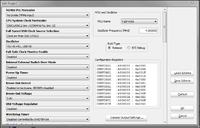AliRazoR
Advanced Member level 4
Hi
i am using pic18F4550, in MikroC i put Delay_ms(1000),it works on protuse but when i implement the circuit, it is not working properly. if i make Delay_ms(10000) it works.what is the problem.
(i need 1 second delay)
thanks in advance
i am using pic18F4550, in MikroC i put Delay_ms(1000),it works on protuse but when i implement the circuit, it is not working properly. if i make Delay_ms(10000) it works.what is the problem.
(i need 1 second delay)
thanks in advance
